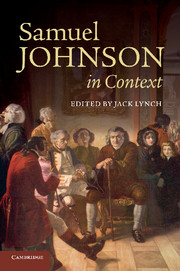Book contents
- Frontmatter
- Contents
- Illustrations
- Contributors
- Preface
- Chronology
- Abbreviations
- Part I Life and works
- Part II Critical fortunes
- Part III Contexts
- Chapter 10 America
- Chapter 11 Anglicanism
- Chapter 12 Anthropology
- Chapter 13 Authorship
- Chapter 14 Biography
- Chapter 15 Book trade
- Chapter 16 Clubs
- Chapter 17 Conversation
- Chapter 18 Dictionaries
- Chapter 19 Domestic life
- Chapter 20 Education
- Chapter 21 Empire
- Chapter 22 Essays
- Chapter 23 Fiction
- Chapter 24 History
- Chapter 25 Journalism
- Chapter 26 Law
- Chapter 27 Literary criticism
- Chapter 28 London
- Chapter 29 Medicine
- Chapter 30 Mental health
- Chapter 31 Money
- Chapter 32 Nationalism
- Chapter 33 Philosophy
- Chapter 34 Poetry
- Chapter 35 Politics
- Chapter 36 Scholarship
- Chapter 37 Science and technology
- Chapter 38 Scotland
- Chapter 39 Sermons
- Chapter 40 Shakespeare
- Chapter 41 Slavery and abolition
- Chapter 42 Social hierarchy
- Chapter 43 Theatre
- Chapter 44 Travel
- Chapter 45 Visual arts
- Chapter 46 War
- Chapter 47 Women writers
- Further reading
- Index
- References
Chapter 27 - Literary criticism
from Part III - Contexts
Published online by Cambridge University Press: 05 June 2012
- Frontmatter
- Contents
- Illustrations
- Contributors
- Preface
- Chronology
- Abbreviations
- Part I Life and works
- Part II Critical fortunes
- Part III Contexts
- Chapter 10 America
- Chapter 11 Anglicanism
- Chapter 12 Anthropology
- Chapter 13 Authorship
- Chapter 14 Biography
- Chapter 15 Book trade
- Chapter 16 Clubs
- Chapter 17 Conversation
- Chapter 18 Dictionaries
- Chapter 19 Domestic life
- Chapter 20 Education
- Chapter 21 Empire
- Chapter 22 Essays
- Chapter 23 Fiction
- Chapter 24 History
- Chapter 25 Journalism
- Chapter 26 Law
- Chapter 27 Literary criticism
- Chapter 28 London
- Chapter 29 Medicine
- Chapter 30 Mental health
- Chapter 31 Money
- Chapter 32 Nationalism
- Chapter 33 Philosophy
- Chapter 34 Poetry
- Chapter 35 Politics
- Chapter 36 Scholarship
- Chapter 37 Science and technology
- Chapter 38 Scotland
- Chapter 39 Sermons
- Chapter 40 Shakespeare
- Chapter 41 Slavery and abolition
- Chapter 42 Social hierarchy
- Chapter 43 Theatre
- Chapter 44 Travel
- Chapter 45 Visual arts
- Chapter 46 War
- Chapter 47 Women writers
- Further reading
- Index
- References
Summary
Cri′ticism. n.s. [from critick.]
1. Criticism, as it was first instituted by Aristotle, was meant a standard of judging well. Dryden’s Innocence, Pref.
Johnson’s criticism has many sources: in seventeenth-century French critical accomplishments and their contemporary English translations, in Renaissance interpretive scholarship, and in classical Greek and Roman criticism. But it is shaped in no slight measure by the inspirational critical writings, in both verse and prose, of Johnson’s immediate predecessors, John Dryden and Alexander Pope. Johnson called Dryden “the father of English criticism” (Lives, 2:118), and described An Essay on Criticism (1711) as one of Pope’s most dazzling effusions (Lives, 4:68–70). And while Johnson made no personal addition to the established tradition of poetical works on critical subjects, the couplet wisdom of Pope’s poem constructs an idea, and an ideal, of criticism that artistically transcends what can be expressed in simple propositions, and provides Johnson with an articulation of the critic’s role. Many of the attributes of the critical writings of Dryden and of Pope are, at the same time, echoed in the formal properties of Johnson’s criticism, and they presage these properties.
Prefaces and essays
Johnson’s critical writing has roots deep in the tradition of literary-critical “short views” such as Pope had both celebrated and enacted in his Essay. For all its variety – biographical, essayistic, anecdotal, emotional, comedic, closely analytical – his critical work contains no extended treatise or lengthy theoretical excursion.
- Type
- Chapter
- Information
- Samuel Johnson in Context , pp. 234 - 242Publisher: Cambridge University PressPrint publication year: 2011



